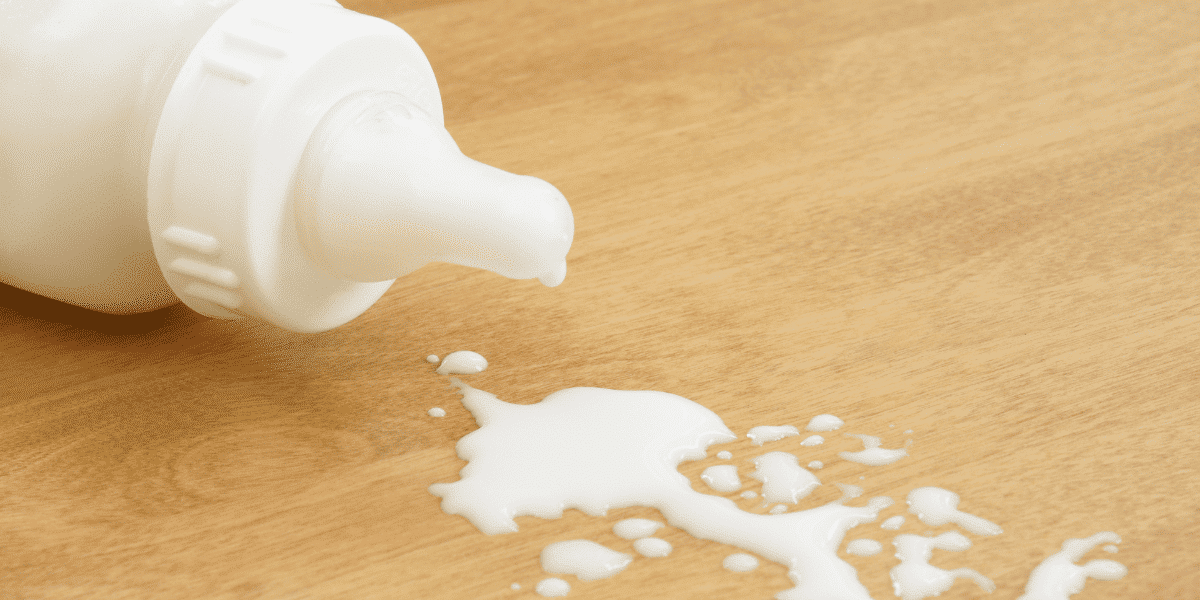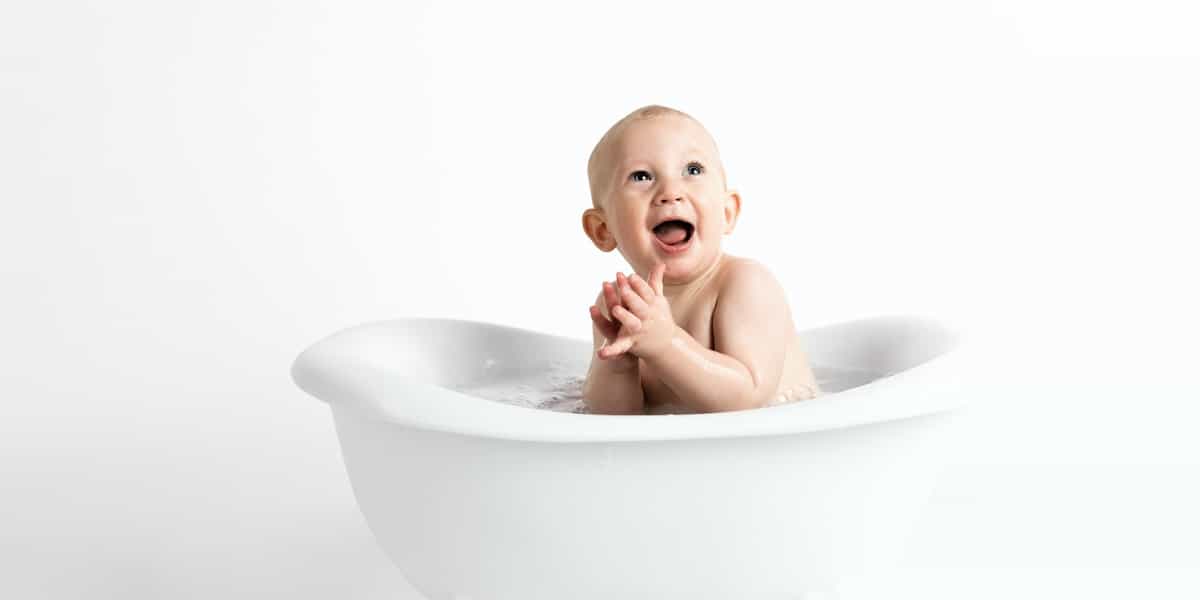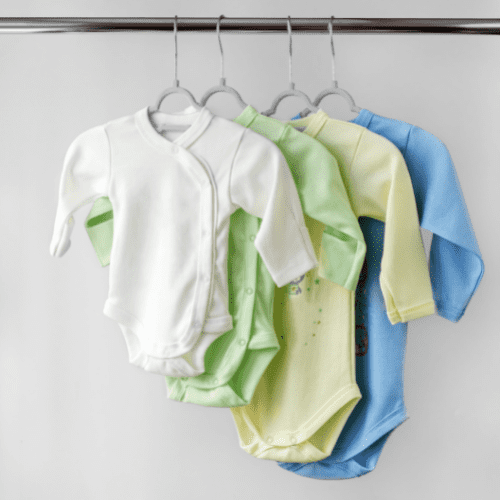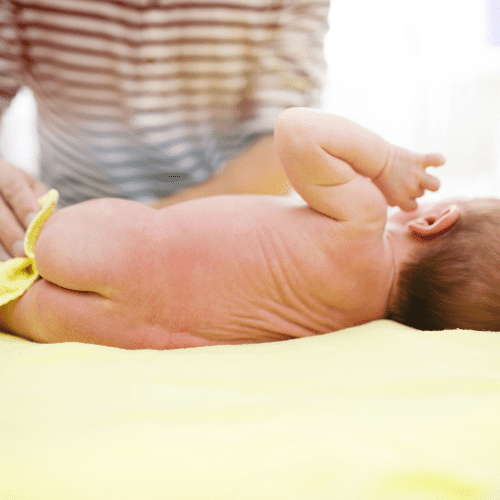Changing your baby’s diapers, you get a whiff of something sour. An acidic stench hits your nose and you gag. The other day your wee one’s poop didn’t smell that bad.
What happened and is there anything you can do?
The vinegar smell of the poop is a reflection of what your baby has been eating and drinking. Yet, it can be an indicator of a health or digestive issue. A change in diet could sort the problem out. If it doesn’t then you need to seek medical advice.
What makes your baby’s poop smell that way?
As an Amazon Associate, I earn from qualifying purchases. The links below may be affiliate links. Please read my disclosure policy for more information.
The reasons that can cause the acidic smell
Most of the factors that contribute to the foul stench are dietary-based. However, there can be health issues that could be the source of the problem.
Lactose Intolerance
According to Healthline.com, 2 to 5 percent of babies are sensitive to cow’s milk.
Lactose intolerance occurs when the body isn’t producing enough lactase. That makes the lactose contained within milk to be harder to digest. The result can be loose poop that smells like vinegar.
Various types of lactose intolerance can affect babies.
Congenital Lactose Intolerance
This is a genetic condition that is inherited from both mother and father. The symptoms appear quite quickly after the birth:
- Watery diarrhea
- Meteorism (swelling of the abdomen due to gas)
- Malnutrition
It is the result of the lactase gene of your baby being deficient or missing.

Galactosemia
Just like Congenital Lactose Intolerance, galactosemia is an inherited condition. One in every 30,000 to 60,000 babies will have Type 1 galactosemia.
For every 100,000 babies, one will have Type 2 galactosemia. Type 3 galactosemia is rare.
Unfortunately, there is no cure for this condition. You need to avoid giving your baby milk or dairy products that have lactose or galactose.
Food Allergies
If you have a family history of a food allergy, then chances are that your baby has it, too. A poop that smells vinegary can be a sign of an allergy. Other symptoms can be:
- A rash
- Flushed skin
- Coughing/Wheezing
- Your baby’s face, tongue, or lips swell
Maybe you are careful with what you feed your baby. Sometimes, there can be some component of baby food or something within your breast milk, that has inadvertently slipped through.
Sensitivity to food
Your wee one may not be allergic to food, but there is a reaction due to sensitivity. Indications of this can be:
- Bloating
- Loose poop
- Being fussy about certain foods
- Inconsolable crying
- Disturbed sleeping
- Passes gas
As with food allergies, you will need to become aware of what foods are the cause.

Malabsorption
If your baby has a problem with absorbing nutrients, it can lead to sour-smelling poop. Other indicators of malabsorption are:
- Cramps within the abdomen
- Your baby starts losing weight
- Bad diarrhea
- Bloating
- Gas
- The weight gain is slower than that of other children the same age
Causes of this health issue can be cancers; Chron’s Disease; Celiac Disease; Pancreatitis; Cystic Fibrosis; and Liver Disease.
It is treatable through medication or nutritional supplements.
Chron’s Disease
The possibility that your baby has this illness is low. It’s a hereditary disease. Medicalnewstoday.com puts the chance of your baby having Chron’s disease at 2 to 9 percent if one parent carries the gene.
The risk triples to 36% if both parents have Chrons.
Smelly stools can be a sign that your baby has Chron’s disease. Here are other signs to look out for:
- Diarrhea that contains blood
- Weight loss
- Pain in the abdomen
- Fever
- A slow linear growth (that is your baby isn’t growing long and tall)
Treatment of Chron’s disease in babies takes the form of medication, dietary supplements, or surgery.
Cystic Fibrosis
There is a one in 3,500 chance that your baby is born with cystic fibrosis. That’s not to upset you, it’s just the way life is.
Vinegary poop can be the result of this sickness. Other symptoms include:
- Coughing/wheezing
- Excessive amounts of mucus in your baby’s lungs
- Your baby always gets lung infections such as bronchitis
- Shortness of breath
- Salty skin
- Your baby eats plenty but doesn’t grow
- Greasy looking poop
- Abdominal pain
- Bloating
Though cystic fibrosis is currently incurable, treatment is possible to help your baby experience a good life.
Surgery, oxygen therapy, and noninvasive ventilation which helps your wee breathe more easily are just some options available.

Should I be worried about my baby?
It is normal for parents to be concerned when their wee one shows unusual physical signs. When poop suddenly starts to smell like vinegar, alarm bells may begin to sound in your head.
Is there something wrong?
The first step is to wait a few days to see if the situation calms down. Some will say to wait for a few weeks. The main thing to look out for is if the problem occurs several times a day.
Having introduced some new food into the diet, your wee one’s system needs time to adjust. However, should the issue last longer than several days, seek medical advice.
If your baby has 6 poops within a quarter of a day, then you should see a doctor immediately.
As mentioned, the smell of the poop could be an indication of an inherited illness such as Chron’s disease or an allergy. You would have been forewarned about the health problem. That doesn’t mean that you shouldn’t worry when your wee one is sick.
When you have any concerns about the wellbeing of your wee one, then talk to your pediatrician.
Treatment for sour-smelling poop
To stop your wee one’s poop from giving off that vinegar stench, you can take a hands-on approach.
Dietary changes
Avoid any milk and dairy products for lactose intolerant babies. Look at swapping these out with milk derived from soy, oat, coconut, or even try goats’ milk.
For mothers who are breastfeeding, a negative reaction to the breastmilk may mean that you need to look at your diet.
Food allergies and sensitivities can require a higher degree of detective work. If you know your baby has inherited these conditions, then you understand what not to feed your wee one.
Otherwise, you are left to work out what item it is that has caused the stinky poop. Keep a detailed account of your babies diet, then look back at the notes.
Electrolyte Solution
This can help flush out any nasties within your baby’s system. Using Pedialyte or Gatorade are the two more popular methods for this treatment.
It works by providing your baby with hydration through sugar, water, and minerals. If your baby is suffering from diarrhea, this is one way of combating dehydration.
Before you consider using this as a treatment option, talk with your pediatrician first.
There is a chance that your child has an allergy reaction. Pedialyte comes with dosage instructions, yet there are variables to consider.
The age, weight, and cause of dehydration need to be taken into account when calculating dose levels.
Supplementation
Babies who are under dietary restrictions can be missing out on necessary nutrients. You can fill in the dietary gaps with mineral and vitamin supplements.
Before rushing out to the pharmacy, talk with your doctor. Consult also with a nutritionist if possible. There is no harm in getting a second opinion.
Deal with infections immediately
Don’t allow the germs to…germinate. Once your baby gets an infection get the antibiotics into her. Attack any bacteria that love to live within the bowels of your baby.
Some illnesses need time to pass. For those, use a combination of antibiotics and rest.
Use the BRAT diet. It is one that pediatricians have suggested in the past to deal with upset tummies. It consists of bananas, rice, applesauce, and toast.
Introducing this diet gives your baby’s stomach a chance to rest while reducing the amount of poop being made.
Preventing the smelly the poop
The best way to deal with stinky poop is by stopping it in the first place. Though it’s not guaranteed, there is something you can do to minimize it from happening.
- Don’t have citrus or sour fruits in your diet when breastfeeding.
- Talk to your doctor about giving your baby probiotics to help keep the digestive system clean
- Enhance digestive absorption by feeding your baby small amounts more regularly
- Wait until your baby turns one before giving her milk (unless she is lactose intolerant)
- Introduce new solids every 3 days
Conclusion

A poop that smells like vinegar can be the result of a change in your baby’s diet. It could also indicate a more serious health issue such as Chron’s disease or cystic fibrosis.
Another factor could be that your baby is having an allergic reaction to something they are eating or drinking
Typically the issue should go away after a few weeks. It takes time for your baby to adjust to new food. If the issue persists, or you are concerned, then talk to your doctor immediately.











